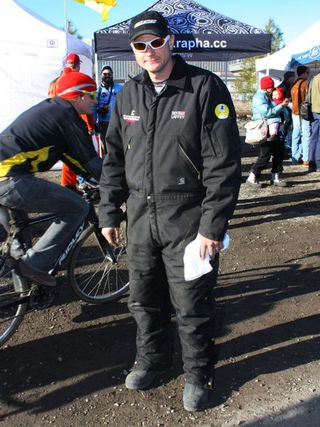Race tech: US cyclo-cross national championships
Life in the pits


























Success in 'cross racing can often rely on the performance of the team's support crew - not just the fitness and skill of the individual rider - and today's US cyclo-cross national championships provided a good example of that.
After a stupendously strong start, Cannondale-Cyclocrossworld.com's Jeremy Powers and Tim Johnson quickly established a solid gap over chaser Ryan Trebon (Kona). However, Powers crashed hard somewhere in the woods, leaving him with a twisted handlebar, a cocked wheel and a mouthful of proverbial dust as the other two riders passed him by.
Powers pulled himself together, though, and a smoothly executed bike change in the pit area kept him from losing any additional time and allowed him to keep a podium position at the finish. Though it goes without saying that Powers would have preferred to have stayed in the lead all the way through to the end for his first stars-and-stripes jersey, his fifth-place finish wouldn't have been impossible had his team not had a spare bike ready to go and a predetermined procedure for the change.
With three top racers on the team to care for, the Cannondale-Cyclocrossworld.com machine amassed a small army of people and equipment to support the effort, including at least five support staff, up to five bikes per rider - all meticulously prepared as usual - and countless wheels. More importantly however, there was a solid plan of action established well before the start whistle.
"Stu Thorne, the team director, is going to pass bikes for Tim [Johnson], Josh Anthony is going to pass bikes for Jamey, we have some other help that we've recruited to pass bikes to J-Pow [Jeremy Powers], we have a guy just to catch bikes and then I'll be on wash detail the entire race," said team mechanic Troy Laffey (pictured below) before the start. "So we've got quite the staff going on to give our guys as many tools as possible to have a successful race."

Kona's support crew was notably smaller for Trebon and teammate Barry Wicks but still seemed to have it together. For Trebon, team mechanic Dusty LaBarr brought "two bikes and a spare set of wheels, a compressor gun, and then some tools, chains, that kind of stuff. I try to be wherever is the best compromise between the best place for [the riders] to pit and the best place to get to the pressure washers, depending on if it's muddy or not."
Additional manpower came from Clement front man Donn Kellogg and Wicks' girlfriend.
Get The Leadout Newsletter
The latest race content, interviews, features, reviews and expert buying guides, direct to your inbox!
Though riders seemed generally pleased with the course design, the pit location and amenities left much to be desired: entry on both sides fell amidst some of the fastest sections of the course and there were no provisions inside the pit area for either water or power. Most teams made do either with portable battery-powered washers or just a big bucket of water and brushes as the lone pair of supplied power washers were uncomfortably far away - and there was no clear path to get there, either.
"It's not ideal," said LaBarr. "I have a pressure washer over there so I'll just run across the course, I guess."
Laffey didn't seem all that concerned, though, as he simply made his own arrangements. His team's pressure washer still wasn't inside the pit area but was still notably easier to access.
"We have our own water supply, our own power supply, our own hoses - we want to be completely self-sufficient and not rely on borrowed or public equipment," he said. "We make sure we don't have to rely on anybody else. That's our motto."
Fortunately, the warm and breezy conditions on Sunday made for a relatively clean day, at least for the men - few riders swapped bikes at all and generally only because of mechanical issues, not mud - and the race organisers will have another year to figure things out before the event makes a return visit next year.